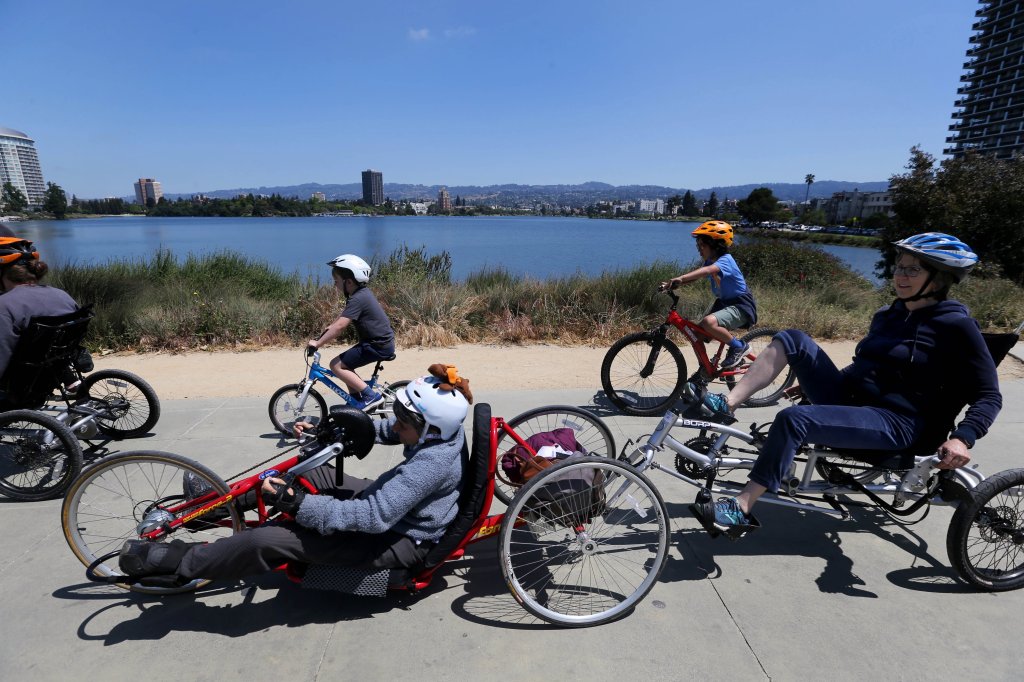OAKLAND — Bonnie Lewkowicz was 15 years old when the all-terrain vehicle she was riding in hit a pothole and flipped over, breaking her neck and paralyzing her from the waist-down.
She had been training to be a dancer, and she craved the physicality she once embodied, later steering her life to a career in physical recreation for people with limited mobility. But, it wasn’t until eight years ago, when she was in her 50s, that she was able to experience a taste of that physical activity on her terms, with a handcycle, a type of tricycle that allows her to push with her arms, rather than her legs.
“It gave me an outlet to feel free,” Lewkowicz said, “and have mobility outside of my wheelchair.”
On Saturday, Lewkowicz got a new taste of that freedom with the launch of Oakland’s adaptive bike-share program, which offers handcycles, tricycles, tandem tricycles and other devices for people with a limited ability to use their arms or legs. It’s the first such program in the Bay Area and one of only a few across the country to include people with disabilities in the short-term rental industry that has exploded in cities around the country over the last several years.

Bay Area Bike Share, now called Ford GoBike, got its start in 2017 with a smattering of bike share stations in Oakland, Berkeley, Emeryville, San Francisco and San Jose. Since then, though, it’s grown to 4,450 bikes across the five cities with plans to grow to 14,200 in the coming years. During the same time period, shared electric scooters and dockless electric bikes have entered the market.
But, what’s been missing in the meteoric rise of the shared bike and scooter industry are devices that people with disabilities can use, said Frank Sperling, the vice chairman of Oakland Mayor Libby Schaaf’s Commission on Persons with Disabilities. It took complaints from members in the commission to spur regional leaders to include people with disabilities in the Ford GoBike program, a public-private partnership among the participating cities, the Metropolitan Transportation Commission and Lyft, which now owns Motivate, the company that operates the program. In Oakland, Ford GoBike partnered with the Bay Area Outreach and Recreation Program, which has been offering outdoor recreation opportunities for Bay Area residents with disabilities for more than 40 years.
“As we develop new technologies, new ways of commuting, new ways of communicating, people with disabilities can no longer be an afterthought,” Sperling said. “They have to be part of the initial planning process.”

In some ways, the Bay Area baked inclusivity into its bike-share program from the outset, with a coalition of bicycle advocacy organizations championing a low-income discount as part of the Ford GoBike program, as well as an option to use Clipper cards to rent the bikes,so people who don’t have a smart-phone can access the rentals, too, said Ginger Jui, the executive director of Bike East Bay, which was a founding member of the coalition, called Bike Share for All.
Last year, TransForm, another member of the coalition, released data showing low-income users made up 20 percent of the Bay Area’s bike share program, the largest proportion of users of any system in the country, whose customers tend to skew white, affluent and male. But Jui said that doesn’t mean the coalition wasn’t without its blind spots.
“We were really focused on access for low-income folks,” she said. “I had a ton of expertise, but even I missed that signal.”
It took nearly two years to get the accessible bike share pilot rolling, Jui said, as a working group studying an existing program in Portland surveyed potential users and tried to think of how best to structure the program. Unlike the traditional model, which focuses on commuters with a point-to-point system, where users check out a bike in one location and drop it off in another, Jui said the accessibility program is focused on recreation. That’s because people who use wheelchairs, walkers or other supports may not able to take the devices with them on the trip.
“And there may be all kinds of other things that come up that we haven’t even thought about yet,” she said, “because we’re still learning.”
As part of a six-month pilot, the accessible bike rentals will be available every Saturday and Wednesday at 1335 Lakeshore Avenue in Oakland on Lake Merritt, until the city finishes rehabbing Snow Park. When that happens, users will be able to check out the bikes at Snow Park. Throughout the first six months, officials will evaluate what types of bicycles are the most popular and how often they are used.

If it’s successful, other cities may look to Oakland as its model for expanding the program, said Kara Oberg, a planner at the MTC. And, already, Lyft is eyeing San Francisco as it’s next location to provide adaptive bike-share rentals.
“Our main goal is to get many different users on bicycles as possible,” Oberg said. “The more inclusive we can make all of our transportation programs the better experience people with have in the Bay Area.”
That’s critical, because as Baby Boomers age and the population of seniors grows, they are living longer and wanting to stay active, even as they lose some of the mobility they had in the past, said Lawrence Carter-Long, a spokesman for the Disability Rights Education & Defense Fund.
“People with disabilities are no longer in the background,” Carter-long said. “What the culture demands is different now.”










